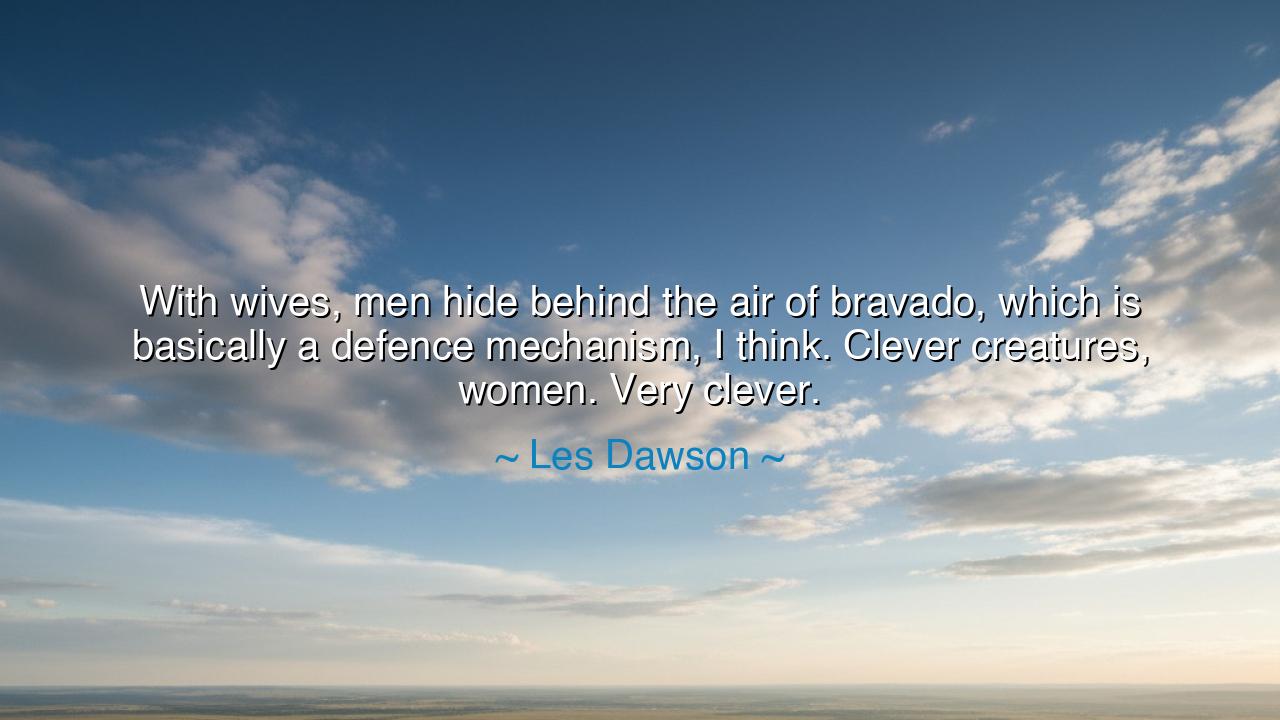
With wives, men hide behind the air of bravado, which is
With wives, men hide behind the air of bravado, which is basically a defence mechanism, I think. Clever creatures, women. Very clever.






The words of Les Dawson, comedian and keen observer of human nature, are spoken in jest yet weighted with truth: “With wives, men hide behind the air of bravado, which is basically a defence mechanism, I think. Clever creatures, women. Very clever.” Here he unveils the fragile armor of bravado—that blustering confidence men often wear before their wives, not out of strength, but out of fear of being seen vulnerable. Beneath the laughter lies wisdom: men protect themselves with noise and show, while women, in their cleverness, see through the mask.
The ancients understood this dance of appearances. In Homer’s epics, the warriors of Greece stood mighty on the battlefield, yet in the quiet of the home, it was Penelope’s steady wisdom that unraveled their pride. Men, strong in war, often cloaked their fears with bold words, while women, grounded in patience and cunning, discerned the truth beneath the surface. Dawson echoes this timeless interplay: that women’s cleverness lies not in loud display, but in subtle perception.
This bravado, as Dawson calls it, is a defence mechanism, a shield against judgment or disappointment. In many ages, men have been taught to equate vulnerability with weakness, and so they strut, boast, or pretend. Yet women, bound to them in daily intimacy, pierce these disguises. They read the tremor beneath the laugh, the hesitation behind the command. Thus Dawson, in his humor, pays tribute: women are indeed clever creatures, wise in ways men often overlook.
Consider the story of Cato the Younger, stoic defender of Rome, who before the Senate showed unshakable pride. Yet it was said that in his household, his wife Marcia knew his doubts and softened his rigid pride with counsel. To the world he wore the mask of certainty; to her, he revealed what lay behind the bravado. This pattern, repeated through centuries, affirms Dawson’s playful truth—that wives often know the real man behind the mask.
Let the generations remember: bravado is but smoke, while true strength lies in honesty. Men may posture, but women, with their keen eyes and patient wisdom, see deeper. Les Dawson, though cloaked in humor, offers a teaching worthy of sages: that men need not fear vulnerability, for it is already known and forgiven by the women who stand beside them. And women, in their cleverness, remind the world that love is not for masks, but for the soul that lies behind them.






NNNguyet Nguyen
I see the point about men using bravado as a defense mechanism, but does it necessarily mean women are clever in this context? Or is it just a perception that men are hiding behind their confidence? Could there be other ways to interpret this? Maybe it’s not about being clever but about women having the emotional intelligence to understand their partners. I’d love to hear different perspectives on this.
NANguyen Tran Nhat Anh
It’s interesting to hear this take on men and women in relationships. Do men really hide behind bravado, or is it just a societal stereotype that doesn't apply to everyone? I can’t help but wonder if this reflects a certain type of masculinity that is often seen as a defense mechanism. Also, if women are clever, do they manipulate this bravado to their advantage, or do they just recognize it for what it is?
LTLoc Tan
The idea of using bravado as a defense mechanism in relationships is something I can relate to, but I wonder if it's an outdated concept. Could it be that both men and women use defense mechanisms, albeit in different ways? If women are as clever as the quote suggests, do they also hide behind their own masks in relationships? It would be interesting to compare how different people cope with emotional exposure in relationships.
MCMinh Chau
I find it fascinating how the quote points to the idea that men use bravado as a defense mechanism, but I wonder if this is always the case. Could it be that men are often taught to mask vulnerability in relationships, which creates this behavior? Women being clever is also an intriguing point—how do women navigate this bravado, and does it give them an advantage in the relationship dynamic?
LQLe Quynh
Is it fair to say that men hide behind bravado in relationships? Could it be that the pressure of social expectations leads to this defense mechanism? If women are clever, as the quote suggests, does this imply that they are more aware of these dynamics? It would be interesting to see how this plays out in modern relationships. Are we still living in a world where these old dynamics persist, or is it evolving?